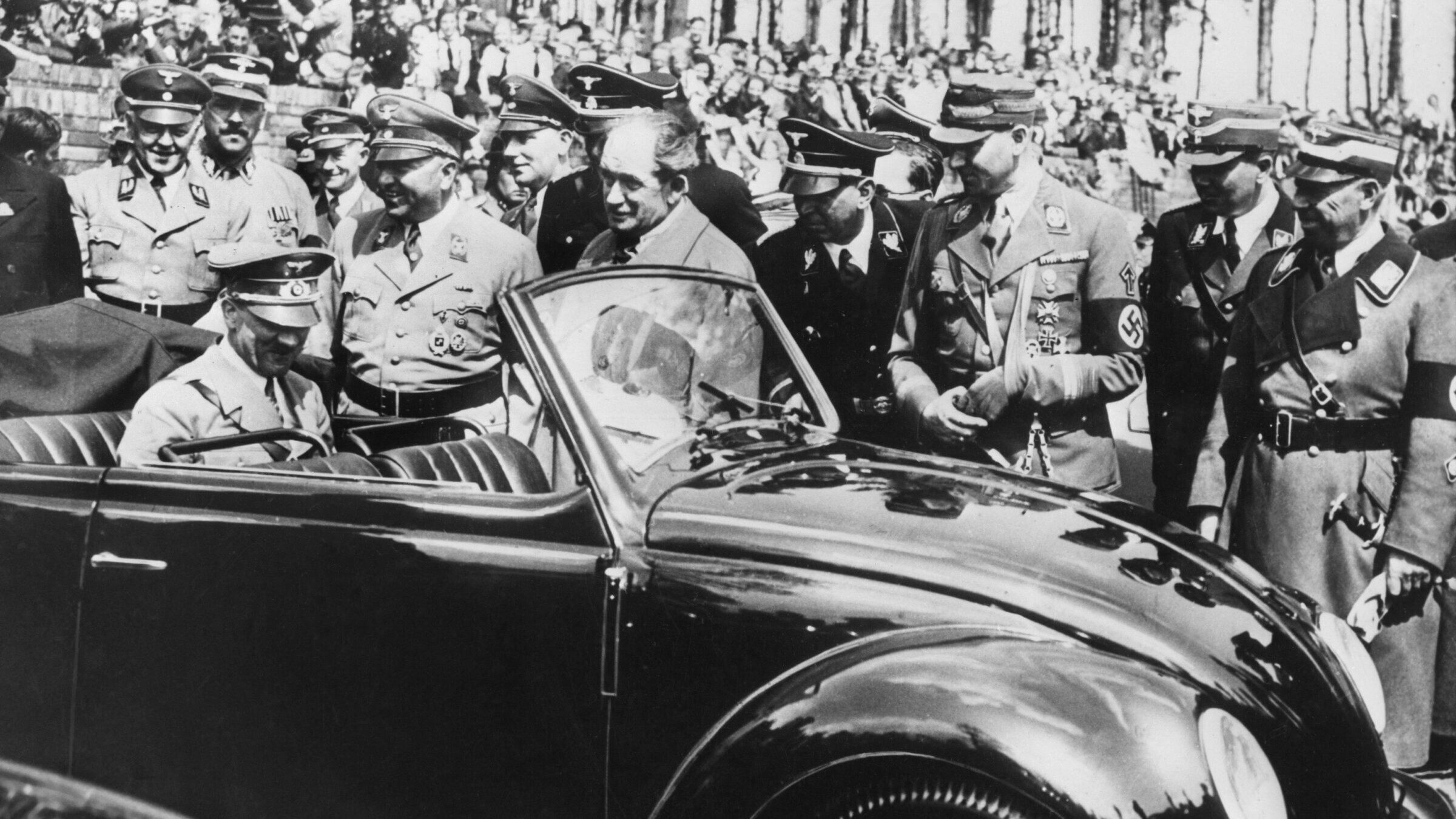They profited from Nazi war crimes; their reckoning is far from over
An impassioned new book chronicles the exploits of billionaires who cozied up to the Third Reich

Adolf Hitler (seated in back) inspects the first Volkswagen “Beetle” produced in Stuttgart in 1937.
Nazi Billionaires: The Dark History of Germany’s Wealthiest Dynasties
By David de Jong
Mariner Books, $28.99, 381 pages
At least since the 1980s, Germany has engaged in a laborious reckoning with the Third Reich’s murderous politics and policies. In his impassioned new book, “Nazi Billionaires,” Dutch journalist David de Jong argues that its reckoning remains grievously incomplete.
The German historian Götz Aly has emphasized the role of financial incentives in fostering popular support of the Nazi regime. Those incentives loomed particularly large for the business dynasties chronicled by de Jong — families that today own German auto companies such as BMW, Porsche and Volkswagen, European luxury hotels, and American brands such as Krispy Kreme, Panera Bread and Dr Pepper.
“Nazi Billionaires,” which moves from the 1930s to the present, is clearly written, but not an easy read. De Jong, who launched his investigation as a business reporter for Bloomberg News, is adept at tracing financial machinations – less so at giving life to his many characters.
It doesn’t help that, for the most part, these tycoons seem bloodless and amoral, “calculating, unscrupulous opportunists,” less interested in Nazi ideology than in enhancing their already profitable balance sheets. Nor that virtually all the heirs to these great and compromised fortunes declined interview requests, obliging de Jong to rely mostly on documentary evidence.

As de Jong clearly intends, the impunity with which these families – the Quandts, Flicks, von Fincks, Porsche-Piëchs, Oetkers and Reimanns – operated, during and after the Nazi period, will stir revulsion. His own antipathy to their behavior, fueled by his family’s history of resistance and Jewish heritage, is unconcealed. De Jong’s epigraph is a quotation from Tacitus that begins: “They have plundered the world, stripping naked the land in their hunger.”
It is galling to learn how readily these businessmen — whose 1930s empires included weapons manufacturing, energy, transportation and banking — agreed to fund the Nazi Party. They eagerly embraced “Aryanization,” the expropriation or forced sale of Jewish-owned enterprises. (Adolf Rosenberger, the Jewish co-founder of the Porsche company, fled Germany after receiving a relative pittance for his shares in the business.) Many of these moguls also acquiesced in the wartime use of forced and slave labor in their factories, condoning or ignoring poor living conditions and brutal treatment.
Few of these men endured significant postwar costs for cozying up to the Nazi regime. One exception was the arms, coal and steel magnate Friedrich Flick, whose factories relied heavily on forced and slave labor, and who was sentenced to seven years in prison. But even he was released two years early, and de Jong tells us that, by the late 1950s, he had become Germany’s wealthiest man.
As in the recruitment of former Nazis as scientists and spies, the United States was complicit, executing a Cold War pivot that prioritized boosting West German manufacturing over punishing perpetrators. No doubt the widespread participation of the German populace in Nazi crimes, including and perhaps especially economic ones, complicated the situation. A whole society couldn’t put itself in prison, not even with outside help and pressure, and even less so when that pressure receded. As de Jong points out, some of the judges involved in Germany’s postwar “denazification” trials had questionable political track records of their own.
In recent years, as part of the ongoing reckoning, German journalists have trained their focus on these wealthy families and companies, surfacing past criminal behavior. Their stories, in turn, have often provoked internal company investigations, some more candid and revealing than others.
De Jong’s archival research has filled in more details. But his greatest contribution surely has been to weave these accounts into a single, complex, dense and infuriating narrative accessible to English-speaking readers.
Perhaps the most interesting tale, on a human level, is that of Günther Quandt, an industrialist who would become the first husband of the woman more familiar to history as Magda Goebbels. Quandt, a widower, was considerably older than his wife, and consumed by his business — textiles and then batteries and weaponry. After their seemingly inevitable divorce, Magda married Josef Goebbels, Hitler’s propaganda minister and they, too, had a tortured marriage. Quandt, while periodically feuding with Goebbels, joined the Nazi Party, and later became a major employer of forced and slave labor.
Before committing suicide with her husband in Hitler’s Berlin bunker, Magda murdered the six children she had with Goebbels. Only Harald Quandt, her son with Quandt, survived her. And he and his half brother, Herbert, from Quandt’s earlier marriage, would become heirs to the Quandt fortune.
Other industrialists were particularly close to Hitler. Baron August von Finck, who presided over a growing insurance and banking empire, chaired the board of Hitler’s Munich art museum. His success, de Jong writes, was due to “business savvy, some good-old fashioned networking, and of course, the spoils of virulent antisemitism.”
Ferdinand Porsche got Hitler’s go-ahead to build the Volkswagen, a car for the masses. But during the war, he switched his efforts to tank design. His Volkswagen factory, run by his son-in-law, Anton Piëch, was staffed by forced and slave laborers, including concentration camp inmates.
Porsche’s son, Ferry, volunteered for the SS. Another business heir, the “pudding prince” Rudolf-August Oetker, joined the Waffen-SS, the group’s military branch, and trained at Dachau. And Otto-Ernst Flick, Friedrich Flick’s oldest son, witnessed SS violence against forced and slave laborers without intervening.
De Jong’s indictments continue in a similar vein, followed by his description of the postwar whitewashing, often through philanthropy, of this criminal history. His investigation suggests that the consequences of Nazi-era profiteering may never be undone. Its beneficiaries remain too rich, too powerful, and too integral to today’s German economy.
Julia M. Klein, the Forward’s contributing book critic, has been a two-time finalist for the National Book Critics Circle’s Nona Balakian Citation for Excellence in Reviewing. Follow her on Twitter @JuliaMKlein






















